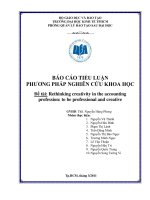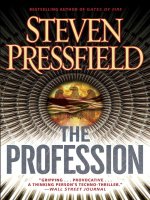Cashel byrons profession
Bạn đang xem bản rút gọn của tài liệu. Xem và tải ngay bản đầy đủ của tài liệu tại đây (932.38 KB, 207 trang )
ProjectGutenberg'sCashelByron'sProfession,byGeorgeBernardShaw
ThiseBookisfortheuseofanyoneanywhereatnocostandwith
almostnorestrictionswhatsoever.Youmaycopyit,giveitawayor
re-useitunderthetermsoftheProjectGutenbergLicenseincluded
withthiseBookoronlineatwww.gutenberg.org
Title:CashelByron'sProfession
Author:GeorgeBernardShaw
ReleaseDate:June,2004[EBook#5872]
ThisfilewasfirstpostedonSeptember15,2002
LastUpdated:September21,2016
Language:English
***STARTOFTHISPROJECTGUTENBERGEBOOKCASHELBYRON'SPROFESSION***
ProducedbyCharlesAldarondo,CharlesFranksandthe
OnlineDistributedProofreadingTeam
HTMLfileproducedbyDavidWidger
CASHELBYRON’SPROFESSION
ByGeorgeBernardShaw
CONTENTS
PROLOGUE
I
II
III
CHAPTERI
CHAPTERII
CHAPTERIII.
CHAPTERIV
CHAPTERV
CHAPTERVI
CHAPTERVII
CHAPTERVIII
CHAPTERIX
CHAPTERX
CHAPTERXI
CHAPTERXII
CHAPTERXIII
CHAPTERXIV
CHAPTERXV
CHAPTERXVI
PROLOGUE
I
Moncrief House, Panley Common. Scholastic establishment for the sons of
gentlemen,etc.
PanleyCommon,viewedfromthebackwindowsofMoncriefHouse,isatract
ofgrass,furzeandrushes,stretchingawaytothewesternhorizon.
Onewetspringafternoontheskywasfullofbrokenclouds,andthecommon
wassweptbytheirshadows,betweenwhichpatchesofgreenandyellowgorse
werebrightinthebrokensunlight.Thehillstothenorthwardwereobscuredbya
heavyshower,tracesofwhichweredryingofftheslatesoftheschool,asquare
whitebuilding,formerlyagentleman’scountry-house.Infrontofitwasawellkeptlawnwithafewclippedholly-trees.Attherear,aquarterofanacreofland
was enclosed for the use of the boys. Strollers on the common could hear, at
certainhours,ahubbubofvoicesandracingfootstepsfromwithintheboundary
wall.Sometimes,whenthestrollerswereboysthemselves,theyclimbedtothe
coping,andsawontheothersideapieceofcommontrampledbareandbrown,
withafewsquareyardsofconcrete,sowornintohollowsastobeunfitforits
original use as a ball-alley. Also a long shed, a pump, a door defaced by
innumerable incised inscriptions, the back of the house in much worse repair
than the front, and about fifty boys in tailless jackets and broad, turned-down
collars.Whenthefiftyboysperceivedastrangeronthewalltheyrushedtothe
spot with a wild halloo, overwhelmed him with insult and defiance, and
dislodged him by a volley of clods, stones, lumps of bread, and such other
projectilesaswereathand.
On this rainy spring afternoon a brougham stood at the door of Moncrief
House. The coachman, enveloped in a white india-rubber coat, was bestirring
himselfalittleafter therecentshower.Within-doors,inthedrawing-room,Dr.
Moncrief was conversing with a stately lady aged about thirty-five, elegantly
dressed, of attractive manner, and only falling short of absolute beauty in her
complexion,whichwasdeficientinfreshness.
“Noprogresswhatever,Iamsorrytosay,”thedoctorwasremarking.
“Thatisverydisappointing,”saidthelady,contractingherbrows.
“Itisnaturalthatyoushouldfeeldisappointed,”repliedthedoctor.“Iwould
myselfearnestlyadviseyoutotrytheeffectofplacinghimatsomeother—”The
doctorstopped.Thelady’sfacehadlitupwithawonderfulsmile,andshehad
raisedherhandwithabewitchinggestureofprotest.
“Oh,no,Dr.Moncrief,”shesaid.“IamnotdisappointedwithYOU;butIam
all the more angry with Cashel, because I know that if he makes no progress
with you it must be his own fault. As to taking him away, that is out of the
question.Ishouldnothaveamoment’speaceifhewereoutofyourcare.Iwill
speak to him very seriously about his conduct before I leave to-day. You will
givehimanothertrial,willyounot?”
“Certainly. With the greatest pleasure,” exclaimed the doctor, confusing
himself by an inept attempt at gallantry. “He shall stay as long as you please.
But”—herethedoctorbecamegraveagain—“youcannottoostronglyurgeupon
himtheimportanceofhardworkatthepresenttime,whichmaybesaidtobethe
turning-pointofhiscareerasastudent.Heisnownearlyseventeen;andhehas
solittleinclinationforstudythatIdoubtwhetherhecouldpasstheexamination
necessary to entering one of the universities. You probably wish him to take a
degreebeforehechoosesaprofession.”
“Yes, of course,” said the lady, vaguely, evidently assenting to the doctor’s
remarkratherthanexpressingaconvictionofherown.“Whatprofessionwould
youadviseforhim?YouknowsomuchbetterthanI.”
“Hum!” said Dr. Moncrief, puzzled. “That would doubtless depend to some
extentonhisowntaste—”
“Notatall,”saidthelady,interruptinghimwithvivacity.“Whatdoesheknow
about the world, poor boy? His own taste is sure to be something ridiculous.
Verylikelyhewouldwanttogoonthestage,likeme.”
“Oh!Thenyouwouldnotencourageanytendencyofthatsort?”
“Mostdecidedlynot.Ihopehehasnosuchidea.”
“NotthatIamawareof.Heshowssolittleambitiontoexcelinanyparticular
branchthatIshouldsayhischoiceofaprofessionmaybebestdeterminedbyhis
parents.Iam,ofcourse,ignorantwhetherhisrelativespossessinfluencelikely
tobeofusetohim.Thatisoftenthechiefpointtobeconsidered,particularlyin
caseslikeyourson’s,wherenospecialaptitudemanifestsitself.”
“Iamtheonlyrelativeheeverhad,poorfellow,”saidthelady,withapensive
smile. Then, seeing an expression of astonishment on the doctor’s face, she
added,quickly,“Theyarealldead.”
“Dearme!”
“However,”shecontinued,“IhavenodoubtIcanmakeplentyofinterestfor
him. But it is difficult to get anything nowadays without passing competitive
examinations.Hereallymustwork.Ifheislazyheoughttobepunished.”
Thedoctorlookedperplexed.“Thefactis,”hesaid,“yoursoncanhardlybe
dealtwithasachildanylonger.Heisstillquiteaboyinhishabitsandideas;but
physically he is rapidly springing up into a young man. That reminds me of
anotherpointonwhichIwillaskyoutospeakearnestlytohim.Imusttellyou
thathehasattainedsomedistinctionamonghisschool-fellowshereasanathlete.
WithindueboundsI donot discouragebodilyexercises: they area recognized
part of our system. But I am sorry to say that Cashel has not escaped that
tendency to violence which sometimes results from the possession of unusual
strengthanddexterity.Heactuallyfoughtwithoneofthevillageyouthsinthe
main street of Panley some months ago. The matter did not come to my ears
immediately; and, when it did, I allowed it to pass unnoticed, as he had
interfered, it seems, to protect one of the smaller boys. Unfortunately he was
guiltyofamuchmoreseriousfaultalittlelater.Heandacompanionofhishad
obtained leave from me to walk to Panley Abbey together. I afterwards found
that their real object was to witness a prize-fight that took place—illegally, of
course—on the common. Apart from the deception practised, I think the taste
they betrayed a dangerous one; and I felt bound to punish them by a severe
imposition,andrestrictiontothegroundsforsixweeks.Idonothold,however,
thateverythinghasbeendoneinthesecaseswhenaboyhasbeenpunished.Iset
a high value on a mother’s influence for softening the natural roughness of
boys.”
“Idon’tthinkhemindswhatIsaytohimintheleast,”saidthelady,witha
sympatheticair,asifshepitiedthedoctorinamatterthatchieflyconcernedhim.
“I will speak to him about it, of course. Fighting is an unbearable habit. His
father’speoplewerealwaysfighting;andtheyneverdidanygoodintheworld.”
“If you will be so kind. There are just the three points: the necessity for
greater—muchgreater—applicationtohisstudies;awordtohimonthesubject
ofroughhabits;andtosoundhimastohischoiceofacareer.Iagreewithyouin
not attaching much importance to his ideas on that subject as yet. Still, even a
boyishfancymaybeturnedtoaccountinrousingtheenergiesofalad.”
“Quiteso,”assentedthelady.“Iwillcertainlygivehimalecture.”
Thedoctorlookedathermistrustfully,thinkingperhapsthatsheherselfwould
bethebetterforalectureonherdutiesasamother.Buthedidnotdaretotellher
so; indeed, having a prejudice to the effect that actresses were deficient in
naturalfeeling,hedoubtedtheuseofdaring.Healsofearedthatthesubjectof
hersonwasbeginningtoboreher;and,thoughadoctorofdivinity,hewasas
reluctantasothermentobefoundwantinginaddressbyaprettywoman.Sohe
rangthebell,andbadetheservantsendMasterCashelByron.Presentlyadoor
was heard to open below, and a buzz of distant voices became audible. The
doctor fidgeted and tried to think of something to say, but his invention failed
him: he sat in silence while the inarticulate buzz rose into a shouting of “Byron!” “Cash!” the latter cry imitated from the summons usually addressed to
cashiersinhaberdashers’shops.Finallytherewasapiercingyellof“Mam-ma-aa-a-ah!”apparentlyinexplanationofthedemandforByron’sattendanceinthe
drawing-room. The doctor reddened. Mrs. Byron smiled. Then the door below
closed,shuttingoutthetumult,andfootstepswereheardonthestairs.
“Comein,”criedthedoctor,encouragingly.
Master Cashel Byron entered blushing; made his way awkwardly to his
mother,andkissedthecriticalexpressionwhichwasonherupturnedfaceasshe
examinedhisappearance.Beingonlyseventeen,hehadnotyetacquiredataste
forkissing.HeinexpertlygaveMrs.Byronquiteashockbythecollisionoftheir
teeth. Conscious of the failure, he drew himself upright, and tried to hide his
hands,whichwereexceedinglydirty,inthescantyfoldsofhisjacket.Hewasa
well-grown youth, with neck and shoulders already strongly formed, and short
auburn hair curling in little rings close to his scalp. He had blue eyes, and an
expression of boyish good-humor, which, however, did not convey any
assuranceofgoodtemper.
“How do you do, Cashel?” said Mrs. Byron, in a queenly manner, after a
prolongedlookathim.
“Verywell,thanks,”saidhe,grinningandavoidinghereye.
“Sit down, Byron,” said the doctor. Byron suddenly forgot how to sit down,
and looked irresolutely from one chair to another. The doctor made a brief
excuse,andlefttheroom;muchtothereliefofhispupil.
“You have grown greatly, Cashel. And I am afraid you are very awkward.”
Cashelcoloredandlookedgloomy.
“Idonotknowwhatto dowith you,”continued Mrs.Byron.“Dr.Moncrief
tellsmethatyouareveryidleandrough.”
“Iamnot,”saidCashel,sulkily.“Itisbec—”
“There is no use in contradicting me in that fashion,” said Mrs. Byron,
interruptinghimsharply.“IamsurethatwhateverDr.Moncriefsaysisperfectly
true.”
“Heisalwaystalkinglikethat,”saidCashel,plaintively.“Ican’tlearnLatin
andGreek;andIdon’tseewhatgoodtheyare.Iworkashardasanyoftherest
—excepttheregularstews,perhaps.Astomybeingrough,thatisallbecauseI
wasoutonedaywithGullyMolesworth,andwesawacrowdonthecommon,
and when we went to see what was up it was two men fighting. It wasn’t our
faultthattheycametheretofight.”
“Yes;Ihavenodoubtthatyouhavefiftygoodexcuses,Cashel.ButIwillnot
allowanyfighting;andyoureallymustworkharder.Doyoueverthinkofhow
hardIhavetoworktopayDr.Moncriefonehundredandtwentypoundsayear
foryou?”
“IworkashardasIcan.OldMoncriefseemstothinkthatafellowoughtto
donothingelsefrommorningtillnightbutwriteLatinverses.Tatham,thatthe
doctorthinkssuchagenius,doesallhisconsteringfromcribs.IfIhadacribI
couldconsteraswell—verylikelybetter.”
“Youareveryidle,Cashel;Iamsureofthat.Itistooprovokingtothrowaway
somuchmoneyeveryyearfornothing.Besides,youmustsoonbethinkingofa
profession.”
“I shall go into the army,” said Cashel. “It is the only profession for a
gentleman.”
Mrs.Byronlookedathimforamomentasifamazedathispresumption.But
she checked herself and only said, “I am afraid you will have to choose some
less expensive profession than that. Besides, you would have to pass an
examinationtoenableyoutoenterthearmy;andhowcanyoudothatunlessyou
study?”
“Oh,Ishalldothatallrightenoughwhenthetimecomes.”
“Dear, dear! You are beginning to speak so coarsely, Cashel. After all the
painsItookwithyouathome!”
“Ispeakthesameasotherpeople,”hereplied,sullenly.“Idon’tseetheuseof
being so jolly particular over every syllable. I used to have to stand no end of
chaff about my way of speaking. The fellows here know all about you, of
course.”
“Allaboutme?”repeatedMrs.Byron,lookingathimcuriously.
“All aboutyourbeing onthestage,Imean,”saidCashel.“Youcomplainof
myfighting;butIshouldhaveapreciousbadtimeofitifIdidn’tlickthechaff
outofsomeofthem.”
Mrs. Byron smiled doubtfully to herself, and remained silent and thoughtful
foramoment.Thensheroseandsaid,glancingattheweather,“Imustgonow,
Cashel,beforeanothershowerbegins.Anddo,pray,trytolearnsomething,and
to polish your manners a little. You will have to go to Cambridge soon, you
know.”
“Cambridge!”exclaimedCashel,excited.“When,mamma?When?”
“Oh,Idon’tknow.Notyet.AssoonasDr.Moncriefsaysyouarefittogo.”
“Thatwillbelongenough,”saidCashel,muchdejectedbythisreply.“Hewill
notturnonehundredandtwentypoundsayearoutofdoorsinahurry.Hekept
bigInglishereuntilhewaspasttwenty.Lookhere,mamma;mightIgoatthe
endofthishalf?IfeelsureIshoulddobetteratCambridgethanhere.”
“Nonsense,”saidMrs.Byron,decidedly.“Idonotexpecttohavetotakeyou
away from Dr. Moncrief for the next eighteen months at least, and not then
unless you work properly. Now don’t grumble, Cashel; you annoy me
exceedinglywhenyoudo.IamsorryImentionedCambridgetoyou.”
“I would rather go to some other school, then,” said Cashel, ruefully. “Old
Moncriefissoawfullydownonme.”
“You only want to leave because you are expected to work here; and that is
theveryreasonIwishyoutostay.”
Cashelmadenoreply;buthisfacedarkenedominously.
“IhaveawordtosaytothedoctorbeforeIgo,”sheadded,reseatingherself.
“Youmayreturntoyourplaynow.Good-bye,Cashel.”Andsheagainraisedher
facetobekissed.
“Good-bye,” said Cashel, huskily, as he turned toward the door, pretending
thathehadnotnoticedheraction.
“Cashel!”shesaid,withemphaticsurprise.“Areyousulky?”
“No,”heretorted,angrily.“Ihaven’tsaidanything.Isupposemymannersare
notgoodenough,I’mverysorry;butIcan’thelpit.”
“Verywell,”saidMrs.Byron,firmly.“Youcango,Cashel.Iamnotpleased
withyou.”
Cashel walked out of the room and slammed the door. At the foot of the
staircase he was stopped by a boy about a year younger than himself, who
accostedhimeagerly.
“Howmuchdidshegiveyou?”hewhispered.
“Notahalfpenny,”repliedCashel,grindinghisteeth.
“Oh, I say!” exclaimed the other, much disappointed. “That was beastly
mean.”
“She’sasmeanasshecanbe,”saidCashel.“It’salloldMonkey’sfault.He
hasbeencrammingherwithliesaboutme.Butshe’sjustasbadasheis.Itell
you,Gully,Ihatemymother.”
“Oh,come!”saidGully,shocked.“That’salittletoostrong,oldchap.Butshe
certainlyoughttohavestoodsomething.”
“Idon’tknowwhatyouintendtodo,Gully;butImeantobolt.IfshethinksI
amgoingtostickhereforthenexttwoyearssheisjollymuchmistaken.”
“It would be an awful lark to bolt,” said Gully, with a chuckle. “But,” he
added,seriously,“ifyoureallymeanit,byGeorge,I’llgotoo!Wilsonhasjust
givenmeathousandlines;andI’llbehangedifIdothem.”
“Gully,” said Cashel, his eyes sparkling, “I should like to see one of those
chapswesawonthecommonpitchintothedoctor—gethimontheropes,you
know.”
Gully’s mouth watered. “Yes,” he said, breathlessly; “particularly the fellow
theycalledtheFibber.Justoneroundwouldbeenoughfortheoldbeggar.Let’s
comeoutintotheplayground;IshallcatchitifIamfoundhere.”
II
Thatnighttherewasjustsufficientlightstrugglingthroughthecloudstomake
PanleyCommonvisibleasablackexpanse,againstthelightesttoneofwhicha
pieceofebonywouldhaveappearedpale.Notahumanbeingwasstirringwithin
amileofMoncriefHouse,thechimneysofwhich,ghostlywhiteonthesidenext
the moon, threw long shadows on the silver-gray slates. The stillness had just
beenbrokenbythestrokeofaquarterpasttwelvefromadistantchurchtower,
when,fromtheobscurityofoneofthesechimneyshadows,aheademerged.It
belonged to a boy, whose body presently wriggled through an open skylight.
When his shoulders were through he turned himself face upward, seized the
miniaturegableinwhichtheskylightwasset,drewhimselfcompletelyout,and
madehiswaystealthilydowntotheparapet.Hewasimmediatelyfollowedby
anotherboy.
ThedoorofMoncriefHousewasattheleft-handcornerofthefront,andwas
surmounted by a tall porch, the top of which was flat and could be used as a
balcony.Awall,ofthesameheightastheporch,connectedthehousefrontwith
theboundarywall,andformedpartoftheenclosureofafruitgardenwhichlay
at the side of the house between the lawn and the playground. When the two
boys had crept along the parapet to a point directly above the porch they
stopped, and each lowered a pair of boots to the balcony by means of fishinglines. When the boots were safely landed, their owners let the lines drop and
reenteredthehousebyanotherskylight.Aminuteelapsed.Thentheyreappeared
onthetopoftheporch,havingcomeoutthroughthewindowtowhichitserved
asabalcony.Heretheyputontheirboots,andsteppedontothewallofthefruit
garden.Astheycrawledalongit,thehindmostboywhispered.
“Isay,Cashy.”
“Shutup,willyou,”repliedtheotherunderhisbreath.“What’swrong?”
“IshouldliketohaveonemoregoatoldmotherMoncrief’spear-tree;that’s
all.”
“Therearenopearsonitthisseason,youfool.”
“Iknow.Thisisthelasttimeweshallgothisroad,Cashy.Usen’tittobea
lark?Eh?”
“Ifyoudon’tshutup,itwon’tbethelasttime;foryou’llbecaught.Nowfor
it.”
Cashelhadreachedtheouterwall,andhefinishedhissentencebydropping
fromittothecommon.Gullyheldhisbreathforsomemomentsafterthenoise
made by hiscompanion’sstrikingtheground.Then he demandedina whisper
whetherallwasright.
“Yes,”returnedCashel,impatiently.“Dropassoftasyoucan.”
Gullyobeyed;andwassocarefullesthisdescentshouldshaketheearthand
awake the doctor, that his feet shrank from the concussion. He alighted in a
sitting posture, and remained there, looking up at Cashel with a stunned
expression.
“Crikey!”heejaculated,presently.“Thatwasabuster.”
“Get up, I tell you,” said Cashel. “I never saw such a jolly ass as you are.
Here,upwithyou!Haveyougotyourwindback?”
“Ishouldthinkso.BetyoutwopenceI’llbefirstatthecrossroads.Isay,let’s
pull the bell at the front gate and give an awful yell before we start. They’ll
nevercatchus.”
“Yes,” said Cashel, ironically; “I fancy I see myself doing it, or you either.
Nowthen.One,two,three,andaway.”
Theyranofftogether,andreachedthecrossroadsabouteightminuteslater;
Gully completely out of breath, and Cashel nearly so. Here, according to their
plan, Gully was to take the north road and run to Scotland, where he felt sure
thathisuncle’sgamekeeperwouldhidehim.Cashelwastogotosea;where,he
argued, he could, if his affairs became desperate, turn pirate, and achieve
eminenceinthatprofessionbyaddingachivalroushumanitytotherudervirtues
forwhichitisalreadyfamous.
CashelwaiteduntilGullyhadrecoveredfromhisrace.Thenhesaid.
“Now,oldfellow,we’vegottoseparate.”
Gully,thusconfrontedwiththelonelyrealitiesofhisscheme,didnotlikethe
prospect.Afteramoment’sreflectionheexclaimed:
“Damme,oldchap,butI’llcomewithyou.Scotlandmaygoandbehanged.”
ButCashel,beingthestrongerofthetwo,wasasanxioustogetridofGullyas
Gully was to cling to him. “No,” he said; “I’m going to rough it; and you
wouldn’t be able for that. You’re not strong enough for a sea life. Why, man,
thosesailorfellowsareashardasnails;andeventheycanhardlystandit.”
“Well, then, do you come with me,” urged Gully. “My uncle’s gamekeeper
won’tmind.He’sajollygoodsort;andweshallhavenoendofshooting.”
“That’sallverywellforyou,Gully;butIdon’tknowyouruncle;andI’mnot
goingtoputmyselfunderacomplimenttohisgamekeeper.Besides,weshould
runtoomuchriskofbeingcaughtifwewentthroughthecountrytogether.Of
courseIshouldbeonlytoogladifwecouldsticktooneanother,butitwouldn’t
do;Ifeelcertainweshouldbenabbed.Good-bye.”
“Butwaitaminute,”pleadedGully.“Supposetheydotrytocatchus;weshall
haveabetterchanceagainstthemiftherearetwoofus.”
“Stuff!” said Cashel. “That’s all boyish nonsense. There will be at least six
policemensentafterus;andevenifIdidmyverybest,Icouldbarelylicktwoif
they came on together. And you would hardly be able for one. You just keep
moving,anddon’tgonearanyrailwaystation,andyouwillgettoScotlandall
safe enough. Look here, we have wasted five minutes already. I have got my
windnow,andImustbeoff.Good-bye.”
GullydisdainedtopresshiscompanyonCashelanyfurther.“Good-bye,”he
said,mournfullyshakinghishand.“Success,oldchap.”
“Success,”echoedCashel,graspingGully’shandwithapangofremorsefor
leavinghim.“I’llwritetoyouassoonasIhaveanythingtotellyou.Itmaybe
somemonths,youknow,beforeIgetregularlysettled.”
He gave Gully a final squeeze, released him, and darted off along the road
leading to Panley Village. Gully looked after him for a moment, and then ran
awayScotlandwards.
Panley Village consisted of a High Street, with an old-fashioned inn at one
end, a modern railway station and bridge at the other, and a pump and pound
midwaybetween.Cashelstoodforawhileintheshadowunderthebridgebefore
venturing along the broad, moonlit street. Seeing no one, he stepped out at a
briskwalkingpace;forhehadbythistimereflectedthatitwasnotpossibleto
runallthewaytotheSpanishmain.Therewas,however,anotherpersonstirring
inthevillagebesidesCashel.ThiswasMr.Wilson,Dr.Moncrief’sprofessorof
mathematics,whowasreturningfromavisittothetheatre.Mr.Wilsonhadan
impression that theatres were wicked places, to be visited by respectable men
onlyonrareoccasionsandbystealth.Theonlyplayshewentopenlytowitness
werethoseofShakespeare;andhisfavoritewas“AsYouLikeIt”;Rosalindin
tights having an attraction for him which he missed in Lady Macbeth in
petticoats. On this evening he had seen Rosalind impersonated by a famous
actress, who had come to a neighboring town on a starring tour. After the
performancehehadreturnedtoPanley,suppedtherewithafriend,andwasnow
making his way back to Moncrief House, of which he had been intrusted with
thekey.Hewasinaframeofmindfavorableforthecaptureofarunawayboy.
An habitual delight in being too clever for his pupils, fostered by frequently
overreaching them in mathematics, was just now stimulated by the effect of a
liberalsupperandtheroguishconsciousnessofhavingbeentotheplay.Hesaw
and recognized Cashel as he approached the village pound. Understanding the
situationatonce,he hidbehind the pump,waiteduntiltheunsuspectingtruant
was passing within arm’s-length, and then stepped out and seized him by the
collarofhisjacket.
“Well,sir,”hesaid.“Whatareyoudoinghereatthishour?Eh?”
Cashel,scaredandwhite,lookedupathim,andcouldnotansweraword.
“Comealongwithme,”saidWilson,sternly.
Cashelsufferedhimselftobeledforsometwentyyards.Thenhestoppedand
burstintotears.
“Thereisnouseinmygoingback,”hesaid,sobbing.“Ihaveneverdoneany
goodthere.Ican’tgoback.”
“Indeed,”saidWilson,withmagisterialsarcasm.“Weshalltrytomakeyoudo
betterinfuture.”Andheforcedthefugitivetoresumehismarch.
Cashel,bitterlyhumiliatedbyhisowntears,andexasperatedbyacertaincold
triumph which his captor evinced on witnessing them, did not go many steps
fartherwithoutprotest.
“Youneedn’tholdme,”hesaid,angrily;“Icanwalkwithoutbeingheld.”The
master tightened his grasp and pushed his captive forward. “I won’t run away,
sir,” said Cashel, more humbly, shedding fresh tears. “Please let me go,” he
added,inasuffocatedvoice,tryingtoturnhisfacetowardhiscaptor.ButWilson
twisted him back again, and urged him still onward. Cashel cried out
passionately,“Letmego,”andstruggledtobreakloose.
“Come, come, Byron,” said the master, controlling him with a broad, strong
hand;“noneofyournonsense,sir.”
ThenCashelsuddenlyslippedoutofhisjacket,turnedonWilson,andstruck
upathimsavagelywithhisrightfist.Themasterreceivedtheblowjustbeside
thepointofhischin;andhiseyesseemedtoCashelrollupandfallbackintohis
headwiththeshock.Hedroopedforwardforamoment,andfellinaheapface
downward. Cashel recoiled, wringing his hand to relieve the tingling of his
knuckles,andterrifiedbythethoughtthathehadcommittedmurder.ButWilson
presentlymovedanddispelledthatmisgiving.SomeofCashel’sfuryreturnedas
heshookhisfistathisprostrateadversary,and,exclaiming,“YOUwon’tbrag
muchofhavingseenmecry,”wrenchedthejacketfromhimwithunnecessary
violence,anddartedawayatfullspeed.
Mr. Wilson, though he was soon conscious and able to rise, did not feel
disposedtostirforalongtime.Hebegantomoanwithadazedfaiththatsome
onewouldeventuallycometohimwithsympathyandassistance.Fiveminutes
elapsed,andbroughtnothingbutincreasedcoldandpain.Itoccurredtohimthat
ifthepolicefoundhimtheywouldsupposehimtobedrunk;alsothatitwashis
dutytogotothemandgivethemthealarm.Herose,and,afterastrugglewith
dizzinessandnausea,concludedthathismostpressingdutywastogettobed,
andleaveDr.Moncrieftorecapturehisruffianlypupilasbesthecould.
Accordingly,athalf-pastoneo’clock,thedoctorwasrousedbyaknockingat
his chamber-door, outside which he presently found his professor of
mathematics, bruised, muddy, and apparently inebriated. Five minutes elapsed
before Wilson could get his principal’s mind on the right track. Then the boys
wereawakenedandtherollcalled.ByronandMolesworthwerereportedabsent.
Noonehadseenthemgo;noonehadtheleastsuspicionofhowtheygotoutof
the house. One little boy mentioned the skylight; but observing a threatening
expressiononthefacesofafewofthebiggerboys,whowerefondoffruit,he
did not press his suggestion, and submitted to be snubbed by the doctor for
havingmadeit.Itwasnearlythreeo’clockbeforethealarmreachedthevillage,
where the authorities tacitly declined to trouble themselves about it until
morning. The doctor, convinced that the lad had gone to his mother, did not
believethatanysearchwasnecessary,andcontentedhimselfwithwritinganote
toMrs.ByrondescribingtheattackonMr.Wilson,andexpressingregretthatno
proposalhavingforitsobjectthereadmissionofMasterByrontotheacademy
couldbeentertained.
ThepursuitwasnowdirectedentirelyafterMolesworth,anitwanplain,from
Mr. Wilson’s narrative, that he had separated from Cashel outside Panley.
Informationwassoonforthcoming.Peasantsinallpartsofthecountryhadseen,
they said, “a lad that might be him.” The search lasted until five o’clock next
afternoon, when it was rendered superfluous by the appearance of Gully in
person, footsore and repentant. After parting from Cashel and walking two
miles, he had lost heart and turned back. Half way to the cross roads he had
reproachedhimselfwithcowardice,andresumedhisflight.Thistimeheplaced
eightmilesbetwixthimselfandMoncriefHouse.Thenhelefttheroadtomakea
shortcutthroughaplantation,andwentastray.Afterwanderinguntilmorning,
thinking dejectedly of the story of the babes in the wood, he saw a woman
working in a field, and asked her the shortest way to Scotland. She had never
heardofScotland;andwhenheaskedthewaytoPanleyshelostpatienceand
threatened to set her dog at him. This discouraged him so much that he was
afraid to speak to the other strangers whom he met. Having the sun as a
compass,heoscillatedbetweenScotlandandPanleyaccordingtothefluctuation
ofhiscourage.Atlastheyieldedtohunger,fatigue,andloneliness,devotedhis
remaining energy to the task of getting back to school; struck the common at
last, and hastened to surrender himself to the doctor, who menaced him with
immediateexpulsion.Gullywasgreatlyconcernedathavingtoleavetheplace
hehadjustrunawayfrom,andearnestlybeggedthedoctortogivehimanother
chance. His prayer was granted. After a prolonged lecture, the doctor, in
consideration of the facts that Gully had been seduced by the example of a
desperateassociate,thathehadprovedthesincerityofhisrepentancebycoming
back of his own accord, and had not been accessory to the concussion of the
brain from which Mr. Wilson supposed himself to be suffering, accepted his
promise of amendment and gave him a free pardon. It should be added that
Gullykepthispromise,and,beingnowtheoldestpupil,gracedhispositionby
becomingamoderatelystudious,and,ononeoccasion,evenasensiblelad.
Meanwhile Mrs. Byron, not suspecting the importance of the doctor’s note,
andhappeningtobeinahurrywhenitarrived,laiditbyunopened,intendingto
readitatherleisure.Shewouldhaveforgottenitaltogetherbutforasecondnote
which came two days later, requesting some acknowledgment of the previous
communication.OnlearningthetruthsheimmediatelydrovetoMoncriefHouse,
andthereabusedthedoctorashehadneverbeenabusedinhislifebefore;after
which she begged his pardon, and implored him to assist her to recover her
darlingboy.Whenhesuggestedthatsheshouldofferarewardforinformation
andcapturesheindignantlyrefusedtospendafarthingonthelittleingrate;wept
andaccusedherselfofhavingdrivenhimawaybyherunkindness;stormedand
accused the doctor of having treated him harshly; and, finally, said that she
would give one hundred pounds to have him back, but that she would never
speak to him again. The doctor promised to undertake the search, and would
have promised anything to get rid of his visitor. A reward of fifty pounds was
offered.Butwhetherthefearoffallingintotheclutchesofthelawformurderous
assault stimulated Cashel to extraordinary precaution, or whether he had
contrivedtoleavethecountryinthefourdayswhichelapsedbetweenhisflight
andtheofferofthereward,thedoctor’seffortswereunsuccessful;andhehadto
confess their failure to Mrs. Byron. She agreeably surprised him by writing a
pleasantlettertotheeffectthatitwasveryprovoking,andthatshecouldnever
thank him sufficiently for all the trouble he had taken. And so the matter
dropped.
LongafterthatgenerationofscholarshadpassedawayfromMoncriefHouse,
the name of Cashel Byron was remembered there as that of a hero who, after
manyfabulousexploits,hadlickedamasterandboltedtotheSpanishMain.
III
There was at this time in the city of Melbourne, in Australia, a wooden
building,abovethedoorofwhichwasaboardinscribed“GYMNASIUMAND
SCHOOL OF ARMS.” In the long, narrow entry hung a framed manuscript
whichsetforththatNedSkene,ex-championofEnglandandthecolonies,was
tobeheardofwithindailybygentlemendesirousofbecomingproficientinthe
artofself-defence.AlsothetermsonwhichMrs.Skene,assistedbyacompetent
staffofprofessors,wouldgivelessonsindancing,deportment,andcalisthenics.
Oneeveningamansatsmokingonacommonwoodenchairoutsidethedoor
of this establishment. On the ground beside him were some tin tacks and a
hammer, with which he had just nailed to the doorpost a card on which was
written in a woman’s handwriting: “WANTED A MALE ATTENDANT WHO
CAN KEEP ACCOUNTS. INQUIRE WITHIN.” The smoker was a powerful
man,withathickneckthatswelledoutbeneathhisbroad,flatear-lobes.Hehad
smalleyes,andlargeteeth,overwhichhislipswereslightlypartedinagoodhumoredbutcunningsmile.Hishairwasblackandclose-cut;hisskinindurated;
and the bridge of his nose smashed level with his face. The tip, however, was
uninjured. It was squab and glossy, and, by giving the whole feature an air of
being on the point of expanding to its original shape, produced a snubbed
expression which relieved the otherwise formidable aspect of the man, and
recommended him as probably a modest and affable fellow when sober and
unprovoked.Heseemedaboutfiftyyearsofage,andwascladinastrawhatand
asuitofwhitelinen.
He had just finished his pipe when a youth stopped to read the card on the
doorpost. This youth was attired in a coarse sailor’s jersey and a pair of gray
tweedtrousers,whichhehadconsiderablyoutgrown.
“Lookingforajob?”inquiredtheex-championofEnglandandthecolonies.
Theyouthblushedandreplied,“Yes.Ishouldliketogetsomethingtodo.”
Mr. Skene stared at him with stern curiosity. His piofessional pursuits had
familiarized him with the manners and speech of English gentlemen, and he
immediatelyrecognizedtheshabbysailorladasoneofthatclass.
“Perhapsyou’reascholar,”saidtheprize-fighter,afteramoment’sreflection.
“I have been at school; but I didn’t learn much there,” replied the youth. “I
thinkIcouldbookkeepbydoubleentry,”headded,glancingatthecard.
“Doubleentry!What’sthat?”
“It’sthewaymerchants’booksarekept.Itiscalledsobecauseeverythingis
enteredtwiceover.”
“Ah!”saidSkene,unfavorablyimpressedbythesystem;“onceisenoughfor
me.What’syourweight?”
“Idon’tknow,”saidthelad,withagrin.
“Notknowyourownweight!”exclaimedSkene.“Thatain’tthewaytogeton
inlife.”
“Ihaven’tbeenweighedsinceIwasinEngland,”saidtheother,beginningto
getthebetterofhisshyness.“Iwaseightstonefourthen;soyouseeIamonlya
light-weight.”
“And what do you know about light-weights? Perhaps, being so well
educated,youknowhowtofight.Eh?”
“Idon’tthinkIcouldfightyou,”saidtheyouth,withanothergrin.
Skenechuckled;andthestranger,withboyishcommunicativeness,gavehim
an account of a real fight (meaning, apparently, one between professional
pugilists) which he had seen in England. He went on to describe how he had
himselfknockeddownamasterwithoneblowwhenrunningawayfromschool.
Skenereceivedthissceptically,andcross-examinedthenarratorastothemanner
andeffectoftheblow,withtheresultofconvincinghimselfthatthestorywas
true. At the end of a quarter of an hour the lad had commended himself so
favorablybyhisconversationthatthechampiontookhimintothegymnasium,
weighedhim,measuredhim,andfinallyhandedhimapairofboxingglovesand
invitedhimtoshowwhathewasmadeof.Theyouth,thoughimpressedbythe
prize-fighter’s attitude with a hopeless sense of the impossibility of reaching
him, rushed boldly at him several times, knocking his face on each occasion
againstSkene’sleftfist,whichseemedtobeubiquitous,andtohavetheproperty
ofimpartingtheconsistencyofirontopaddedleather.Atlastthenovicedirected
afranticassaultatthechampion’snose,risingonhistoesinhisexcitementashe
did so. Skene struck up the blow with his right arm, and the impetuous youth
spunandstumbledawayuntilhefellsupineinacorner,rappinghisheadsmartly
ontheflooratthesametime.Herosewithunabatedcheerfulnessandofferedto
continue the combat; but Skene declined any further exercise just then, and,
much pleased with his novice’s game, promised to give him a scientific
educationandmakeamanofhim.
The champion now sent for his wife, whom he revered as a preeminently
sensible and well-mannered woman. The newcomer could see in her only a
ridiculousdancing-mistress;buthetreatedherwithgreatdeference,andthereby
improved the favorable opinion which Skene had already formed of him. He
related to her how, after running away from school, he had made his way to
Liverpool, gone to the docks, and contrived to hide himself on board a ship
boundforAustralia.Alsohowhehadsufferedseverelyfromhungerandthirst
beforehe discovered himself;andhow, notwithstandinghisunpopularposition
as stowaway, he had been fairly treated as soon as he had shown that he was
willingtowork.Andinproofthathewasstillwilling,andhadprofitedbyhis
maritimeexperience,heofferedtosweepthefloorofthegymnasiumthenand
there. This proposal convinced the Skenes, who had listened to his story like
childrenlisteningtoafairytale,thathewasnottoomuchofagentlemantodo
roughwork,anditwaspresentlyarrangedthatheshouldthenceforthboardand
lodgewiththem,havefiveshillingsaweekforpocket-money,andbeman-ofall-work, servant, gymnasium-attendant, clerk, and apprentice to the exchampionofEnglandandthecolonies.
Hesoonfoundhisbargainnoeasyone.Thegymnasiumwasopenfromnine
inthemorninguntilelevenatnight,andtheathleticgentlemenwhocamethere
notonlyorderedhimaboutwithoutceremony,butvariedthemonotonyofbeing
setatnaughtbytheinvincibleSkenebypractisingwhathetaughtthemonthe
person of his apprentice, whom they pounded with great relish, and threw
backwards, forwards, and over their shoulders as though he had been but a
senselesseffigy,providedforthatpurpose.Meanwhilethechampionlookedon
and laughed, being too lazy to redeem his promise of teaching the novice to
defend himself. The latter, however, watched the lessons which he saw daily
given to others, and, before the end of a month, he so completely turned the
tablesontheamateurpugilistsofMelbournethatSkeneonedaytookoccasion
toremarkthathewasgrowinguncommonclever,butthatgentlemenlikedtobe
played easy with, and that he should be careful not to knock them about too
much.Besidesthesebodilyexertions,hehadtokeepaccountofglovesandfoils
soldandbought,andofthefeesduebothtoMr.andMrs.Skene.Thiswasthe
mostirksomepartofhisduty;forhewrotealarge,schoolboyhand,andwasnot
quickatfigures.Whenheatlastbegantoassisthismasteringivinglessonsthe
accountshadfallenintoarrear,andMrs.Skenehadtoresumeherformercareof
them; a circumstance which gratified her husband, who regarded it as a fresh
triumph of her superior intelligence. Then a Chinaman was engaged to do the
more menial work of the establishment. “Skene’s novice,” as he was now
generallycalled,waselevatedtotherankofassistantprofessortothechampion,
andbecameapersonofsomeconsequenceinthegymnasium.
Hehadbeentheremorethanninemonths,andhaddevelopedfromanactive
youth into an athletic young man of eighteen, when an important conversation
tookplacebetweenhimandhisprincipal.Itwasevening,andtheonlypersons
in the gymnasium were Ned Skene, who sat smoking at his ease with his coat
off,andthenovice,whohadjustcomedown-stairsfromhisbedroom,wherehe
hadbeenpreparingforavisittothetheatre.
“Well,mygentleman,”saidSkene,mockingly;“you’reafancyman,youare.
Glovestoo!They’retoosmallforyou.Don’tyougethittin’nobodywiththem
on,oryou’llmebbesprainyourwrist.”
“Not much fear of that,” said the novice, looking at his watch, and, finding
thathehadsomeminutestospare,sittingdownoppositeSkene.
“No,”assentedthechampion.“Whenyourisetobearegularprofessionalyou
won’tcaretosparwithnobodywithoutyou’rewellpaidforit.”
“ImaysayIamintheprofessionalready.Youdon’tcallmeanamateur,do
you?”
“Oh,no,”saidSkene,soothingly;“notsobadasthat.Butmindyou,myboy,I
don’t callnomana fighting-manwhatain’tbeenin thering.You’reasparrer,
and a clever, pretty sparrer; but sparring ain’t the real thing. Some day, please
God,we’llmakeupalittlematchforyou,andshowwhatyoucandowithoutthe
gloves.”
“I would just as soon have the gloves off as on,” said the novice, a little
sulkily.
“That’sbecauseyouhaveaheartasbigasalion,”saidSkene,pattinghimon
the shoulder. But the novice, who was accustomed to hear his master pay the
samecomplimenttohispatronswhenevertheywereseizedwithfitsofboasting
(which usually happened when they got beaten), looked obdurate and said
nothing.
“SamDucket,ofMilltown,washereto-daywhileyouwasoutgivingCaptain
Noble his lesson,” continued Skene, watching his apprentice’s face cunningly.
“NowSamisarealfighting-man,ifyoulike.”
“Idon’tthinkmuchofhim.He’saliar,foronething.”
“That’safailingoftheprofession.Idon’tmindtellingYOUso,”saidSkene,
mournfully. Now the novice had found out this for himself, already. He never,
for instance, believed the accounts which his master gave of the accidents and
conspiracies which had led to his being defeated three times in the ring.
However, as Skene had won fifteen battles, his next remark was undeniable.
“Men fight none the worse for being liars. Sam Ducket bet Ebony Muley in
twentyminutes.”
“Yes,”saidthenovice,scornfully;“andwhatisEbonyMuley?Awretchedold
niggernearlysixtyyearsold,whoisdrunksevendaysintheweek,andwould
sellafightforaglassofbrandy!Ducketoughttohaveknockedhimoutoftime
inseventyseconds.Duckethasnoscience.”
“Notabit,”saidNed.“Buthehaslotsofgame.”
“Pshaw! Come, now, Ned; you know as well as I do that that is one of the
stalestcommonplacesgoing.Ifafellowknowshowtobox,theyalwayssayhe
has science but no pluck. If he doesn’t know his right hand from his left, they
saythatheisn’tcleverbutthatheisfullofgame.”
Skene looked with secret wonder at his pupil, whose powers of observation
and expression sometimes seemed to him almost to rival those of Mrs. Skene.
“Samwassayingsomethinglikethatto-day,”heremarked.“Hesaysyou’reonly
asparrer,andthatyou’dfalldownwithfrightifyouwasputintoatwenty-fourfootring.”
Thenoviceflushed.“IwishIhadbeenherewhenSumDucketsaidthat.”
“Why,whatcouldyouha’donetohim?”saidSkene,hissmalleyestwinkling.
“I’dhavepunchedhishead;that’swhatIcouldandwouldhavedonetohim.”
“Why,man,he’deatyou.”
“Hemight.Andhemighteatyoutoo,Ned,ifhehadsaltenoughwithyou.He
talksbigbecauseheknowsIhavenomoney;andhepretendshewon’tstripfor
lessthanfiftypoundsaside.”
“No money!” cried Skene. “I know them as’ll make up fifty pound before
twelve to-morrow for any man as I will answer for. There’d be a start for a
young man! Why, my fust fight was for five shillings in Tott’nam Fields; and
proudIwaswhenIwonit.Idon’twanttosetyouontofightacracklikeSam
Ducketanywayagainstyourinclinations;butdon’tgofortosaythatmoneyisn’t
tobehad.LetNedSkenepinttoayoungmanandsay,‘That’stheyoungmanas
Nedbacks,’andotherswillcomefor’ard—ay,crowdsof‘em.”
Thenovicehesitated.“DoyouthinkIoughtto,Ned?”hesaid.
“That ain’t for me to say,” said Skene, doggedly. “I know what I would ha’
saidatyourage.Butperhapsyou’rerighttobecautious.Itellyouthetruth,I
wouldn’tcaretoseeyouwhippedbythelikeofSamDucket.”









